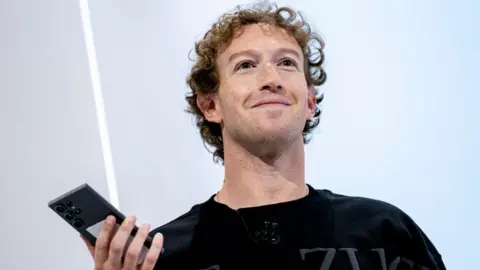In a significant shift in corporate policy, Meta Platforms Inc., the parent company of social media giants like Facebook, Instagram, and WhatsApp, has announced the discontinuation of its diversity programs. This decision aligns Meta with a growing trend among large corporations in the United States that are scaling back on initiatives aimed at promoting diversity, equity, and inclusion (DEI). The move has been met with mixed reactions, revealing the deep divisions in public opinion regarding corporate responsibility and social initiatives.
The announcement was made by Meta’s CEO, Mark Zuckerberg, in a memo to employees which highlighted the “shifting legal and policy landscape” as a key motivator for this decision. This memo also pointed to influential legal rulings that have created a more contentious atmosphere surrounding DEI efforts. In particular, the 2023 ruling by the U.S. Supreme Court, which struck down affirmative action policies in college admissions, has been cited as a significant factor urging corporations to reconsider their diversity strategies. Meta indicated that although they would actively seek diverse candidates, they would no longer base hiring strategies on creating pools of diverse applicants as they had previously attempted.
Meta’s decision comes in the wake of criticism from right-leaning factions in the U.S., including high-profile figures from political spheres, further complicated by past controversies that have plagued the company. In light of mounting pressure during Donald Trump’s presidency, which has invigorated anti-“woke” sentiment, several notable corporations have re-evaluated their diversity commitments, including giants like Walmart and McDonald’s. The broader trend reflects a backlash against what some have labeled as “woke capitalist” policies that embrace progressive stances on social issues.
Furthermore, Meta’s shift coincides with a backlash against multiple corporations perceived to be engaging in what critics deem to be unnecessary political or social activism. Companies such as Bud Light and Target have faced boycotts and public backlash for their initiatives aimed at appealing to LGBTQ+ consumers, a reflection of the societal divide over issues of representation and equality in the marketplace. This has created an environment where corporate actions are magnified and scrutinized, incentivizing companies to tread lightly or drastically change course.
In its memo, Meta also noted that it would be discontinuing collaborations with “diverse” suppliers, opting instead to focus on small and medium-sized companies without the additional emphasis on diversity. The rationale is reflective of a broader corporate strategy that prioritizes economic considerations over social ones amidst a climate of legal uncertainty regarding diversity programs. This approach mirrors decisions made by major banks and investment firms, such as Goldman Sachs and JPMorgan Chase, which have also withdrawn from initiatives focused on the risks of climate change, seeing potential for backlash or regulatory scrutiny.
Critics of DEI initiatives have seized upon recent legal interventions as evidence that these programs are discriminatory. For instance, a ruling from a U.S. appeals court invalidated a policy from the Nasdaq Stock Market that would have mandated board diversity. Such decisions appear to embolden corporate leaders like Zuckerberg to pivot away from established diversity practices that were largely formulated in response to the social upheaval following the murder of George Floyd in 2020 and the subsequent rise of the Black Lives Matter movement.
While Mark Zuckerberg and Meta have been at the forefront of technology and social media expansion, the recent changes reflect a cautionary change in direction concerning social responsibility. Meta’s pivot has ignited a spectrum of responses, from approval among conservatives who champion a return to traditional corporate practices to condemnation from advocates for diversity, equity, and inclusion. Individuals such as conservative activist Robby Starbuck have openly expressed support for these changes, viewing them as victorious campaigns against corporate social programs.
In summary, Meta’s decision to ax its diversity programs represents a broader trend across corporate America toward reassessing or scaling back initiatives that could be interpreted as politically charged. As the landscape evolves, the corporate world finds itself at a crossroads, balancing social responsibility with the pressing realities of legal constraints, public opinion, and economic pressures.



